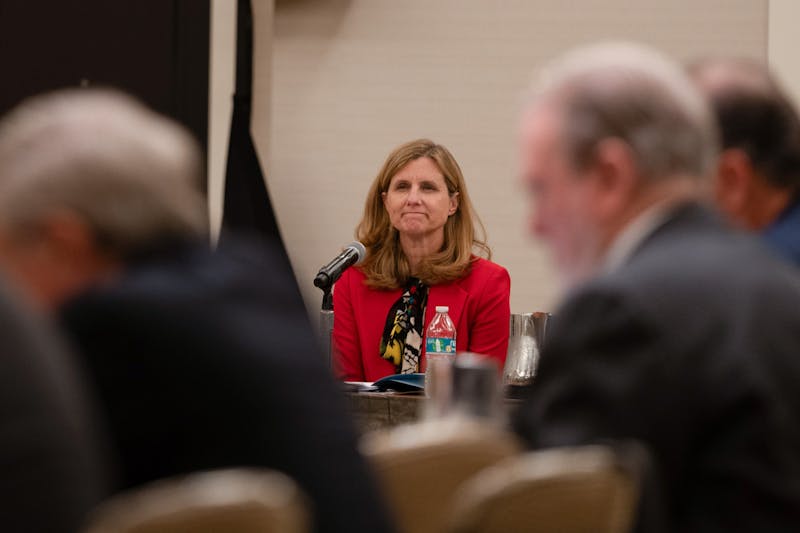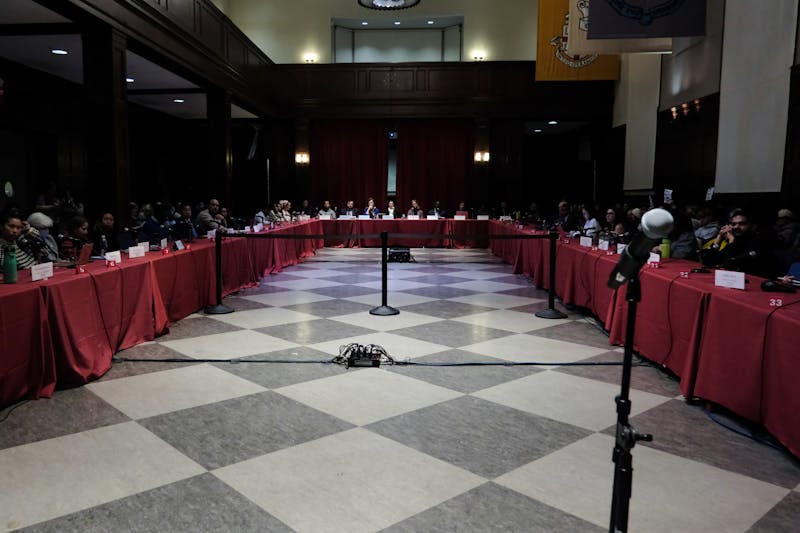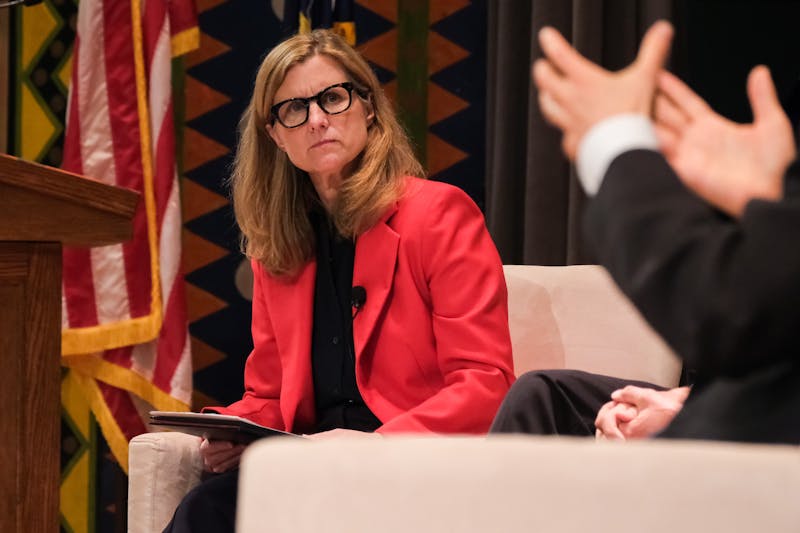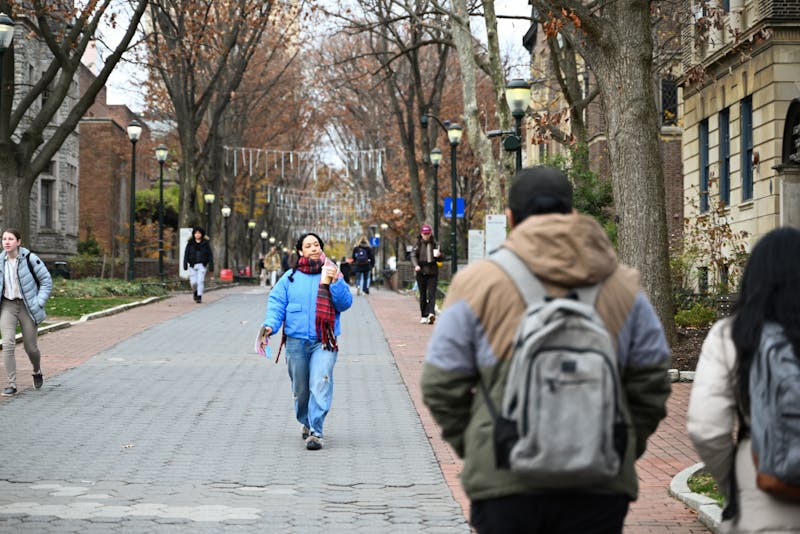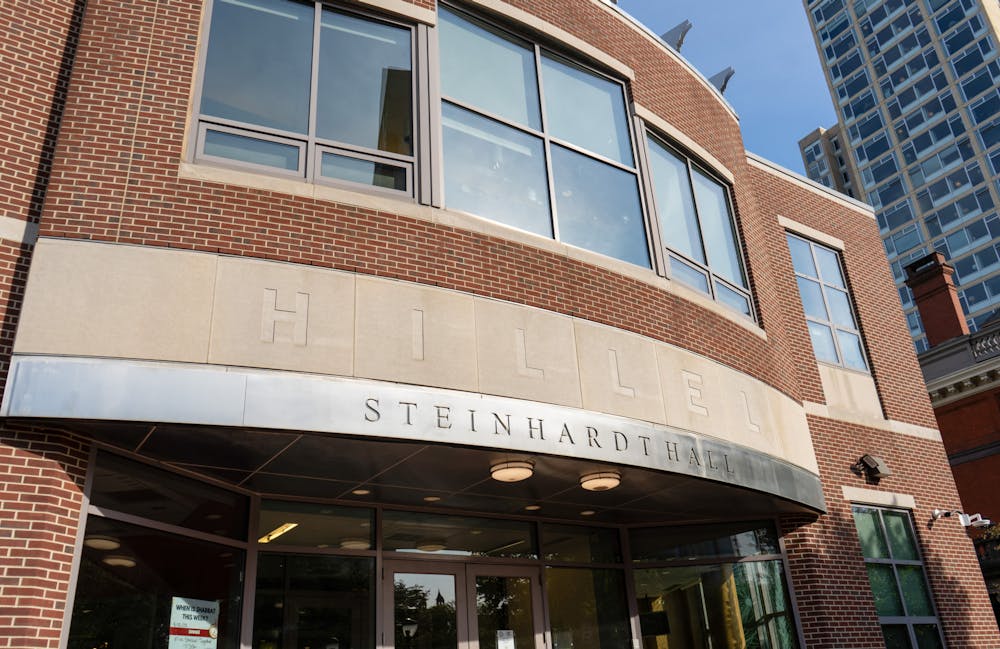
Penn's task force on antisemitism is continuing with its work despite the resignations of former President Liz Magill and Board of Trustees Chair Scott Bok.
The task force — which was formed in November 2023 to provide feedback and policy solutions to combat antisemitism — has been meeting consistently under the leadership of Morton Amsterdam Dean of the School of Dental Medicine Mark Wolff. As the task force takes its work into the spring semester with a new president in office, The Daily Pennsylvanian sat down with Wolff — who acknowledged that the group was working to find consensus despite “massive” differences in opinion.
Wolff also discussed the group’s meetings so far, shared his thoughts on the changes in University leadership, and provided an inside look at the task force's plans to impact the campus community under the direction of Interim President Larry Jameson.
The leadership transition
Magill launched the task force on Nov. 1 of last year as part of a University-wide action plan to combat antisemitism. The announcement came amid escalating violence between Israel and Hamas, and criticism from donors and alumni over the University administration's response to the Palestine Writes Literature festival.
The group held its first meeting on Nov. 16, according to Wolff. The next day, Magill publicly named the full membership of the task force, which includes seven faculty representatives, two student representatives, and six staff, alumni, and Trustee representatives. The announcement called the task force the “centerpiece” of the University’s action plan.
Wolff said that the task force has assembled seven times in person since Nov. 16, with some meetings lasting as long as three hours. In the days surrounding the task force’s inception, he met with Magill “several times” to determine what the group’s objectives would be.
He acknowledged the rapid chain of events involving Magill that followed Thanksgiving break, including the former president’s testimony before Congress about antisemitism on college campuses. Wolff said that he continued communicating regularly with Magill about the task force's status throughout that period.
Jameson was named interim president shortly after Magill resigned on Dec. 9. While Magill’s original announcement charged the group with providing an interim update to the president by Feb. 15, on the day of his appointment, Jameson directed the task force to accelerate its work to a date earlier than previously anticipated, according to Wolff.
“He requested that we provide an interim update to him literally the day he was named as president,” Wolff said. “President Jameson is calling for us to work rapidly and decisively, and publicly talk to our community about what we’re doing and what we can do.”
After the fall semester ended, the task force continued working over winter break and held three meetings before classes started on Jan. 18. Wolff highlighted the sense of “urgency” coming from both Jameson and the Penn community to continue the work of the task force.
“Our community is hurting,” he said. “For so many individuals, the images we see on TV or that we get over social feeds are so painful. We see political reaction, which is what we like to see in a student body. Part of becoming a citizen is having an opinion.”
While recognizing the difficulty of the current campus climate, Wolff emphasized the importance of ensuring that community members “understand how to express themselves in a civil fashion.”
The task force’s areas of focus
Though the group broadly seeks to address antisemitism on campus, members are divided into subgroups that have been working independently on topics related to its central goal.
One area of focus is studying how other U.S. universities are approaching antisemitism on campus. Wolff pointed to resources developed by Stanford University, Dartmouth College, and the University of California, Berkeley, among others, as examples of the types of programs the task force is examining.
The task force has also consulted with individuals outside the University, including the Pennsylvania Governor’s Office, according to Wolff.
Another working group is focused on the University’s bias reporting system. The current form on Penn’s diversity webpage allows individuals to report incidents such as discrimination, harassment, and property damage caused by some form of bias. The fourteen listed bases of incidents on the form include antisemitism, citizenship status, Islamophobia, religion, and sexual orientation.
Wolff said that part of the task force’s work will be explaining the “restorative and investigative practices” that ensure all community members feel comfortable following an incident of bias.
The working group aims to develop a system to ensure that those who feel unsafe due to their Arab, Palestinian, Muslim, or Jewish identities can report the incident in question, seek protection, and expect an investigation of the complaint.
Wolff also highlighted a working group focused on developing key questions for listening sessions with the Penn community. These sessions will begin shortly, inviting students, faculty, and staff from across all schools to share their concerns related to antisemitism.
Another group is developing educational programming on the history and nature of antisemitism, as well as the importance of civil discussion.
“We're a highly educated community of very bright people," Wolff said. "In a civil society, discourse is okay, but it has to be civil discourse.”
The task force has no disciplinary function, Wolff said. Rather, the group will make recommendations to the University president with strategies for educating the campus community and advancing civil discourse.
Concerns about other forms of hate
When Magill launched the University’s action plan, she also announced a presidential commission to address “the interconnectedness of antisemitism, Islamophobia and other forms of hate, discrimination, and bias" on campus. The group, chaired by two Penn deans Dean of the School of Engineering and Applied Science Vijay Kumar and Dean of the Graduate School of Education Katharine Strunk, now reports to Jameson and announced its members on Jan. 17.
The announcement of the action plan initially drew mixed reactions from the Penn community. Some students said that they appreciated Magill’s recognition of the concerns of the Muslim community, while others questioned whether the University was doing enough to support either Jewish or Palestinian students on campus.
On Jan. 17, a group of Penn faculty announced the formation of Penn Faculty for Justice in Palestine, a group to stand in solidarity with Palestinians — and critiqued the administration's structuring of the two groups.
In a statement published by the DP, PFJP wrote that it was “deeply concerned with the inequality that structures” the administration’s creation of two separate groups, referring to the antisemitism task force and presidential commission. PFJP specifically pointed to the phrasing of the commission’s goal.
Wolff, who sits as an ex-officio member on the presidential commission, said that he attends all of the commission’s meetings. He added that Kumar and Strunk are also present at the meetings of the antisemitism task force as part of coordinating the work of the two groups.
“There’s no way we’re going to do something that will alienate a Muslim or an Arab community in an effort to deal with an antisemitism issue,” Wolff said. “We look to holistically affect our campus.”
Katz Center of Advanced Judaic Studies Director Steven Weitzman, who is a faculty representative on the task force, told the DP it was important to bring together many different types of people to address various forms of hatred and prejudice on campus.
“Antisemitism is not just a Jewish problem. It’s usually a sign of deeper problems in the broader culture,” Weitzman said. “Anytime antisemitism erupts in society, it’s usually accompanying other problems in that society, other forms of prejudice, persecution, authoritarianism.”
An ongoing process
The antisemitism task force consists of 20 community members across several schools and centers. Wolff said there are “massive” differences in opinion within the task force, given the complexity of the topic — yet said that all members are committed to reaching a common agreement on the recommendations to make to Jameson.
Members include Deputy Provost and former Interim Provost Beth Winkelstein, Penn Hillel Executive Director and Rabbi Gabe Greenberg, and University Faculty Senate Tri-Chair Eric Feldman. The student representatives are College junior Maya Harpaz and Graduate and Professional Student Assembly President Michael Krone, a University of Pennsylvania Carey Law School and Wharton MBA student.
“These are thoughtful people, everybody does have an opinion, and we’re trying not to let our opinions be the narrative,” Wolff said. “It’s more important that we are able to find consensus in how we can speak and help the campus.”
Weitzman said that his ideal campus environment would uphold both open expression and respect.
“Those are the goals and we’re trying to get there, but it’s an ongoing process,” Weitzman said.
The task force was originally tasked with submitting a final report by May 17, with the goal of recommending policies that could take effect the next academic year. Looking ahead, Wolff said that the timeline may depend on whether the Penn president deems it necessary for the task force to continue its work.
He added that the group aims to make a long-term impact on campus to make Jewish community members more comfortable at Penn and facilitating discussion between groups that may not "see eye-to-eye."
“I think that you’ll see the output of the antisemitism task force last for years," Wolff said.
The Daily Pennsylvanian is an independent, student-run newspaper. Please consider making a donation to support the coverage that shapes the University. Your generosity ensures a future of strong journalism at Penn.
Donate







